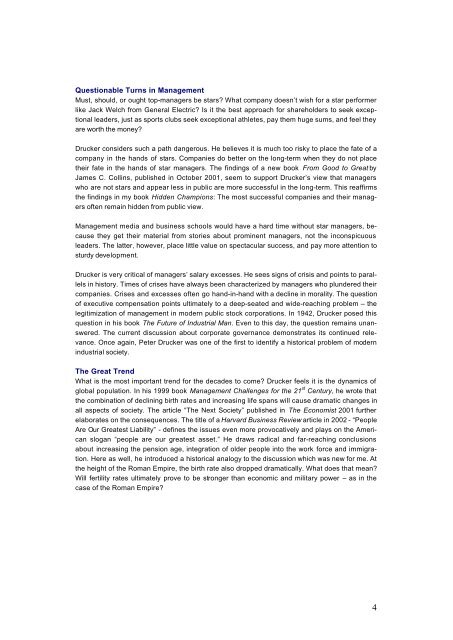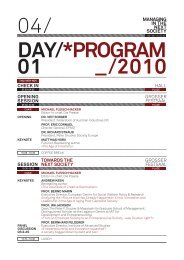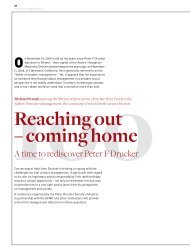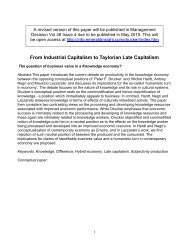Management - beyond the day - Peter Drucker Society of Austria
Management - beyond the day - Peter Drucker Society of Austria
Management - beyond the day - Peter Drucker Society of Austria
You also want an ePaper? Increase the reach of your titles
YUMPU automatically turns print PDFs into web optimized ePapers that Google loves.
Questionable Turns in <strong>Management</strong><br />
Must, should, or ought top-managers be stars What company doesn’t wish for a star performer<br />
like Jack Welch from General Electric Is it <strong>the</strong> best approach for shareholders to seek exceptional<br />
leaders, just as sports clubs seek exceptional athletes, pay <strong>the</strong>m huge sums, and feel <strong>the</strong>y<br />
are worth <strong>the</strong> money<br />
<strong>Drucker</strong> considers such a path dangerous. He believes it is much too risky to place <strong>the</strong> fate <strong>of</strong> a<br />
company in <strong>the</strong> hands <strong>of</strong> stars. Companies do better on <strong>the</strong> long-term when <strong>the</strong>y do not place<br />
<strong>the</strong>ir fate in <strong>the</strong> hands <strong>of</strong> star managers. The findings <strong>of</strong> a new book From Good to Great by<br />
James C. Collins, published in October 2001, seem to support <strong>Drucker</strong>’s view that managers<br />
who are not stars and appear less in public are more successful in <strong>the</strong> long-term. This reaffirms<br />
<strong>the</strong> findings in my book Hidden Champions: The most successful companies and <strong>the</strong>ir managers<br />
<strong>of</strong>ten remain hidden from public view.<br />
<strong>Management</strong> media and business schools would have a hard time without star managers, because<br />
<strong>the</strong>y get <strong>the</strong>ir material from stories about prominent managers, not <strong>the</strong> inconspicuous<br />
leaders. The latter, however, place little value on spectacular success, and pay more attention to<br />
sturdy development.<br />
<strong>Drucker</strong> is very critical <strong>of</strong> managers’ salary excesses. He sees signs <strong>of</strong> crisis and points to parallels<br />
in history. Times <strong>of</strong> crises have always been characterized by managers who plundered <strong>the</strong>ir<br />
companies. Crises and excesses <strong>of</strong>ten go hand-in-hand with a decline in morality. The question<br />
<strong>of</strong> executive compensation points ultimately to a deep-seated and wide-reaching problem – <strong>the</strong><br />
legitimization <strong>of</strong> management in modern public stock corporations. In 1942, <strong>Drucker</strong> posed this<br />
question in his book The Future <strong>of</strong> Industrial Man. Even to this <strong>day</strong>, <strong>the</strong> question remains unanswered.<br />
The current discussion about corporate governance demonstrates its continued relevance.<br />
Once again, <strong>Peter</strong> <strong>Drucker</strong> was one <strong>of</strong> <strong>the</strong> first to identify a historical problem <strong>of</strong> modern<br />
industrial society.<br />
The Great Trend<br />
What is <strong>the</strong> most important trend for <strong>the</strong> decades to come <strong>Drucker</strong> feels it is <strong>the</strong> dynamics <strong>of</strong><br />
global population. In his 1999 book <strong>Management</strong> Challenges for <strong>the</strong> 21 st Century, he wrote that<br />
<strong>the</strong> combination <strong>of</strong> declining birth rates and increasing life spans will cause dramatic changes in<br />
all aspects <strong>of</strong> society. The article “The Next <strong>Society</strong>” published in The Economist 2001 fur<strong>the</strong>r<br />
elaborates on <strong>the</strong> consequences. The title <strong>of</strong> a Harvard Business Review article in 2002 - “People<br />
Are Our Greatest Liability” - defines <strong>the</strong> issues even more provocatively and plays on <strong>the</strong> American<br />
slogan “people are our greatest asset.” He draws radical and far-reaching conclusions<br />
about increasing <strong>the</strong> pension age, integration <strong>of</strong> older people into <strong>the</strong> work force and immigration.<br />
Here as well, he introduced a historical analogy to <strong>the</strong> discussion which was new for me. At<br />
<strong>the</strong> height <strong>of</strong> <strong>the</strong> Roman Empire, <strong>the</strong> birth rate also dropped dramatically. What does that mean<br />
Will fertility rates ultimately prove to be stronger than economic and military power – as in <strong>the</strong><br />
case <strong>of</strong> <strong>the</strong> Roman Empire<br />
4








